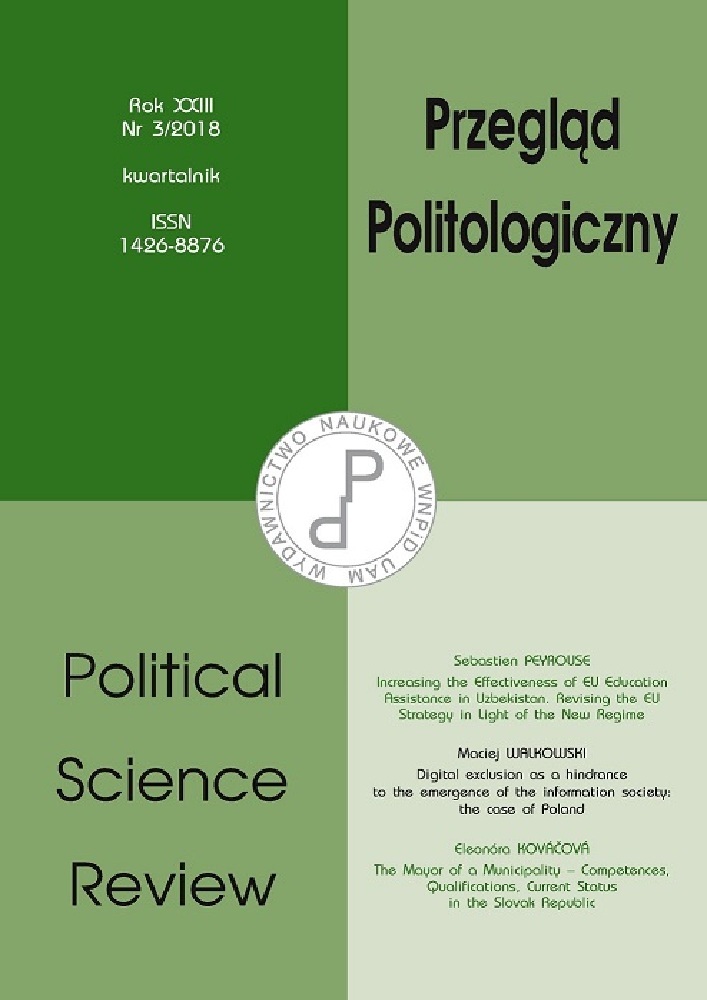Abstrakt
The purpose of this article is to analyze US foreign policy under the new White House administration and to present the most important aspects of Trump’s emerging doctrine, with the aim of answering the following questions: what are the goals and tenets of, and the measures to implement, the foreign policy outlined in the new US National Security Strategy? Which trends can be considered dominant in Trump’s emerging doctrine? What challenges and threats to international security were mentioned in the document? Do traditional US allies still play an important role in the superpower’s security strategy? The thesis of this paper is that political realism is the main trend in Trump’s emerging doctrine and that US foreign policy has taken a unilateral course, with a large dose of populism.
Bibliografia
Bacevich A. (2009), The Limits of Power. The End of American Exceptionalism, Holt Paperbacks, New York.
Borger J. (2017), A blunt, fearful rant: Trump’s UN speech left presidential norms in the dust, “The Guardian,” https://www.theguardian.com/us-news/2017/sep/19/donald-trump-un-speech-analysis-north-korea, 21.02.2018.
Braumoeller B. F. (2010), The Myth of American Isolationism, “Foreign Policy Analysis,” no. 6.
Burchill S. (2006), Realizm i neorealizm, in: Teorie stosunków międzynarodowych, eds. S. Burchill, R. Devetak, A. Linklater, M. Paterson, Ch. Reus-Smit, J. True, Książka i Wiedza, Warszawa.
Cassidy J. (2017), Don’t Be Fooled. Donald Trump Didn’t Pivot, “The New Yorker,” https://www.newyorker.com/news/john-cassidy/dont-be-fooled-donald-trump-didnt-pivot, 20.02.2018.
Chhabra T. (2018), Mapping reactions to Trump’s first National Security Strategy, “Brookings,” https://www.brookings.edu/blog/order-from-chaos/2018/01/10/mapping-reactions-to-trumps-first-national-security-strategy/, 23.02.2018.
Czaputowicz J. (2008), Teorie stosunków międzynarodowych. Krytyka i systematyzacja, Wydawnictwo Naukowe PWN, Warszawa.
Dubenko A. (2017), Right and Left React to Trump’s Speech at the U.N., “The New York Times,” https://www.nytimes.com/2017/09/20/us/politics/trump-un-speech-right-and-left.html, 21.02.2018.
Haass R. N. (2004), Rozważny szeryf. Stany Zjednoczone po zimnej wojnie, Von Borowiecky, Warszawa.
Herz J. H. (1950), Idealist Internationalism and the Security Dilemma, “World Politics,” vol. 2, no. 2.
Kaplan L., Kristol W. (2003), The War over Iraq: Saddam’s Tyranny and America’s Mission, Encounter Books, San Francisco.
Kissinger H. (2009), Dyplomacja, Philip Wilson, Warszawa.
Kramer A. E. (2017), Russia and China Object to New ‘America First’ Security Doctrine, “The New York Times,” https://www.nytimes.com/2017/12/19/world/europe/russia-china-america-firstdoctrine.html, 23.02.2018.
Krauthammer C. (2002), Unilateral? Yes, Indeed, “The Washington Post.”
Kuehl W. F., Ostrower G. B. (2002), Internationalism, in: Encyclopedia Of American Foreign Policy, vol. 1, eds. A. DeConde, R. D. Burns, F. Logevall, L. B. Ketz, Charles Scribner’s Sons, New York.
Lipset S. M. (2008), Wyjątkowość amerykańska – broń obosieczna, Wydawnictwa Akademickie i Profesjonalne, Warszawa.
LoBianco T. (2015), Donald Trump: Crimea is Europe’s problem, 31.07.2015, “CNN,” http://edition.cnn.com/2015/07/31/politics/doanld-trump-crimea-europe-problem/, 26.02.2018.
Moon B. E. (2006), The United States and Globalization: Struggles with Hegemony, in: Political Economy and the Changing Global Order, ed. R. Stubbs, G. R. D. Underhill, Oxford University Press, New York.
Morgenthau H. J. (1967), Politics Among Nations. The Struggle of Power and Peace, Alfred A. Knopf, New York.
Mui Y. Q. (2017), President Trump signs order to withdraw from Trans-Pacific Partnership, “The Washington Post,” https://www.washingtonpost.com/news/wonk/wp/2017/01/23/presidenttrump-signs-order-to-withdraw-from-transpacific-partnership/, 20.02.2018.
Remarks by President Trump in Joint Address to Congress (2017), Washington, D.C, U.S. Capitol, February 28.
Remarks by President Trump on the Administration’s National Security Strategy (2017), Washington, D.C., The White House, December 18.
Remarks by President Trump on the Strategy in Afghanistan and South Asia (2017), Fort Myer, Arlington, August 21.
Remarks by President Trump to the 72nd Session of the United Nations General Assembly (2017), United Nations, New York, September 19.
Rice C. (2000), Promoting the National Interest, “Foreign Affairs,” vol. 79, no. 1.
Shear M. D. (2017), Trump Will Withdraw U.S. From Paris Climate Agreement, “The New York Times,” https://www.nytimes.com/2017/06/01/climate/trump-paris-climate-agreement.html, 26.02.2018.
Stelzer I. (2007), Neokonserwatyzm, Wydawnictwa Akademickie i Profesjonalne, Warszawa.
Szymborski W. (2004), Doktryna Busha, Wydawnictwo Wers, Bydgoszcz.
The National Security Strategy of the United States of America (2017), Washington, D.C., The White House, December.
Thrush G. (2017), 5 Key Takeaways From President Trump’s Speech, “The New York Times,” https://www.nytimes.com/2017/03/01/us/politics/takeaways-president-trump-speech-congress.html, 1.03.2018.
Tokarczyk R. (2006), Cechy konstytutywne myśli populizmu, in: Populizm na przełomie XX i XXI wieku. Panaceum czy pułapka dla współczesnych społeczeństw?, ed. M. Marczewska-Rytko, Wydawnictwo Adam Marszałek, Toruń.
Trump’s first UN speech met with criticism from some leaders (2017), “BBC News,” September 20, http://www.bbc.com/news/world-us-canada-41327130, 21.02.2018.
Ullman R. H. (1983), Redefining Security, “International Security,” vol. 8, no. 1.
Vabulas F. (2017), Trump is pulling the U.S. out of UNESCO. The bigger pattern is the problem, “The
Washington Post,” https://www.washingtonpost.com/news/monkey-cage/wp/2017/10/16/trump-is-pulling-the-u-s-out-of-unesco-the-bigger-pattern-is-the-problem/, 26.02.2018.
Waśko-Owsiejczuk E. (2017a), Is America safer today? The first changes to U.S. foreign and security policy during the presidency of Donald Trump, “Przegląd Politologiczny,” nr 3.
Waśko-Owsiejczuk E. (2017b), Współpraca polityczna i w zakresie bezpieczeństwa Stanów Zjednoczonych z Unią Europejską po amerykańskich wyborach prezydenckich w 2016 r. – kontynuacja czy zmiana?, “Krakowskie Studia Międzynarodowe,” nr 1.
Waśko-Owsiejczuk E. (2018), Koncepcja bezpieczeństwa USA, in: Bezpieczeństwo międzynarodowe w XXI wieku, ed. R. Zięba, Poltex, Warszawa.
Wolffe R. (2017), Donald Trump’s Congress speech was a heroic effort in contradiction and cliché, “The Guardian,” https://www.theguardian.com/us-news/2017/feb/28/trump-congress-speechpolicy-contradictions, 1.03.2018.
Zając J. (2006), Koncepcja polityki zagranicznej USA po zimnej wojnie, in: Polityka zagraniczna USA po zimnej wojnie, ed. J. Zając, Wydawnictwo Adam Marszałek, Toruń.
Zając J. (2008), Koncepcja bezpieczeństwa USA, in: Bezpieczeństwo międzynarodowe po zimnej wojnie, ed. R. Ziba, Wydawnictwa Akademickie i Profesjonalne, Warszawa 2008.

